Unit 2 Let's celebrate! Using language课件(共44张PPT)-2025-2026学年外研版(2019)必修第二册
文档属性
| 名称 | Unit 2 Let's celebrate! Using language课件(共44张PPT)-2025-2026学年外研版(2019)必修第二册 |

|
|
| 格式 | pptx | ||
| 文件大小 | 14.1MB | ||
| 资源类型 | 教案 | ||
| 版本资源 | 外研版(2019) | ||
| 科目 | 英语 | ||
| 更新时间 | 2025-06-14 20:32:07 | ||
图片预览

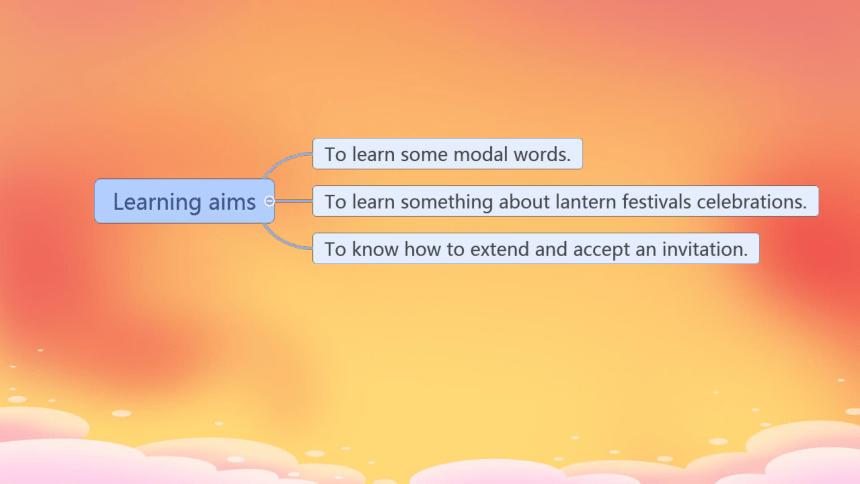
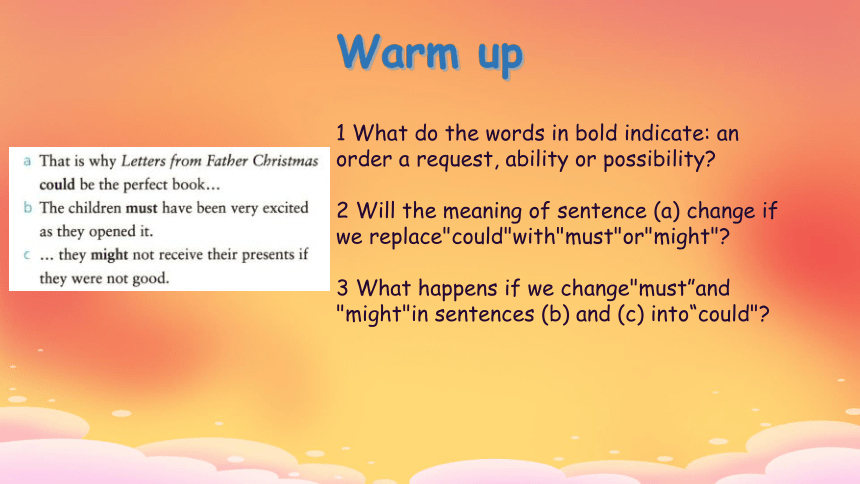
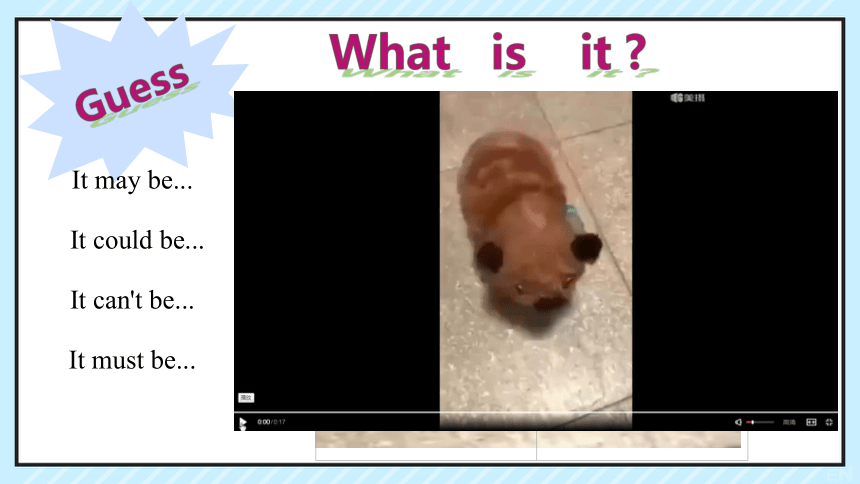
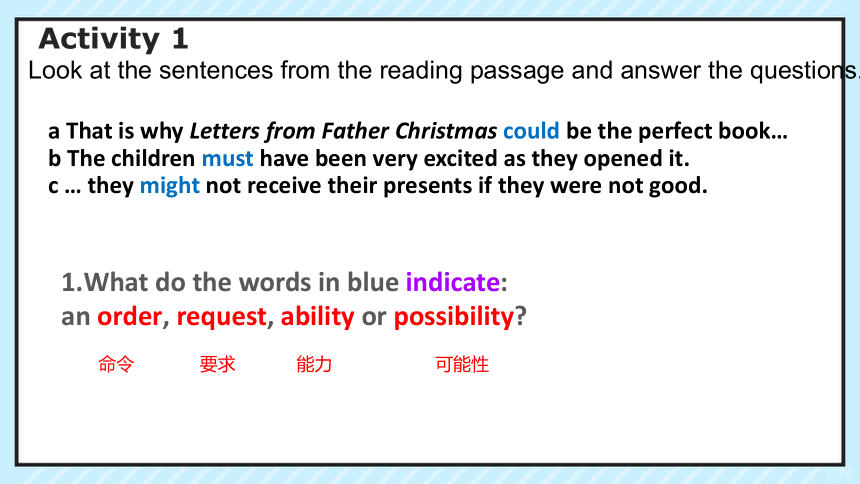
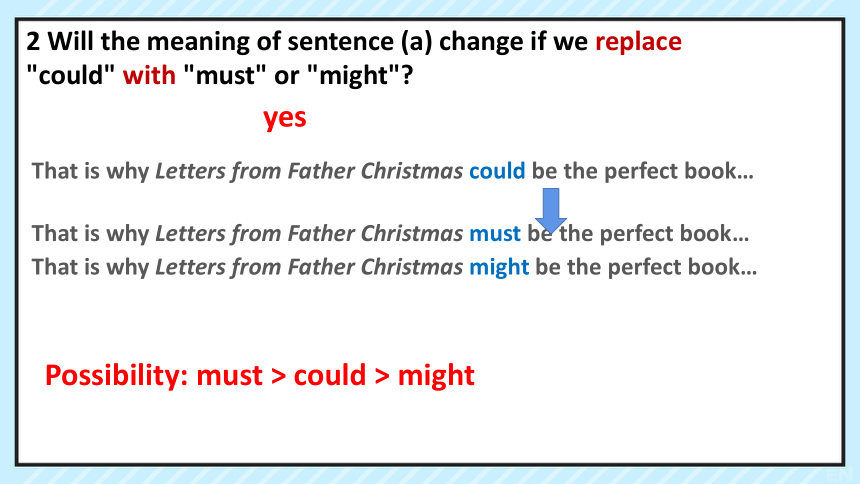
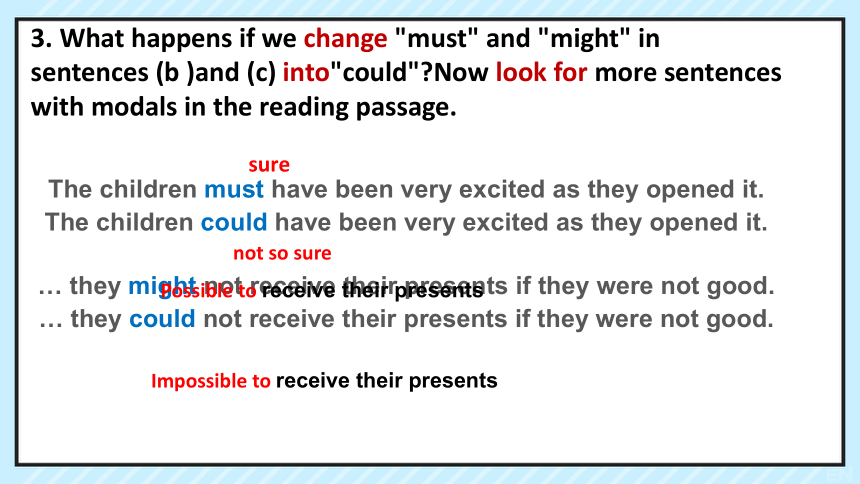
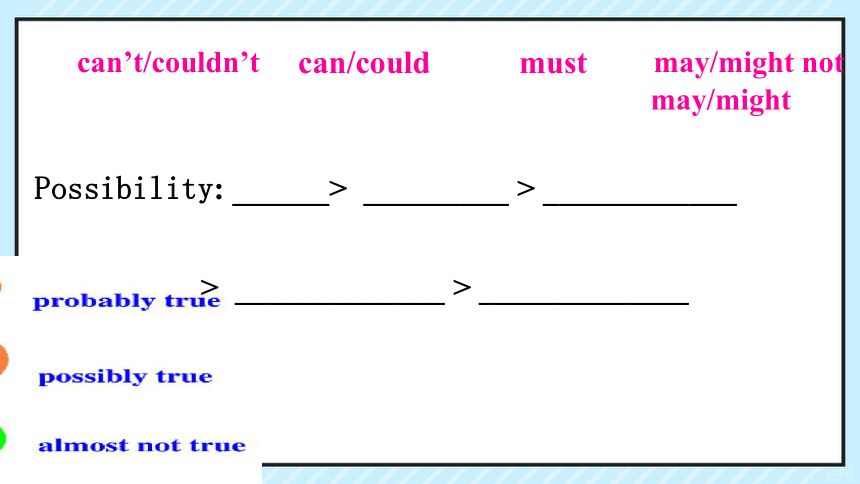
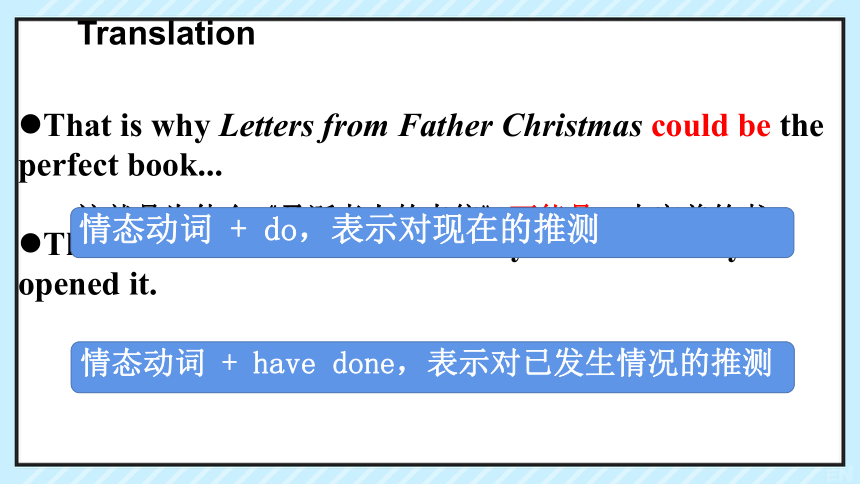
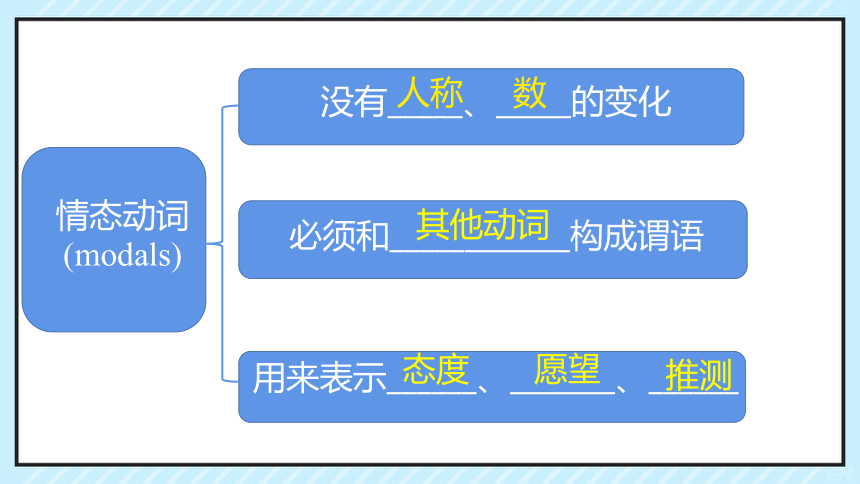
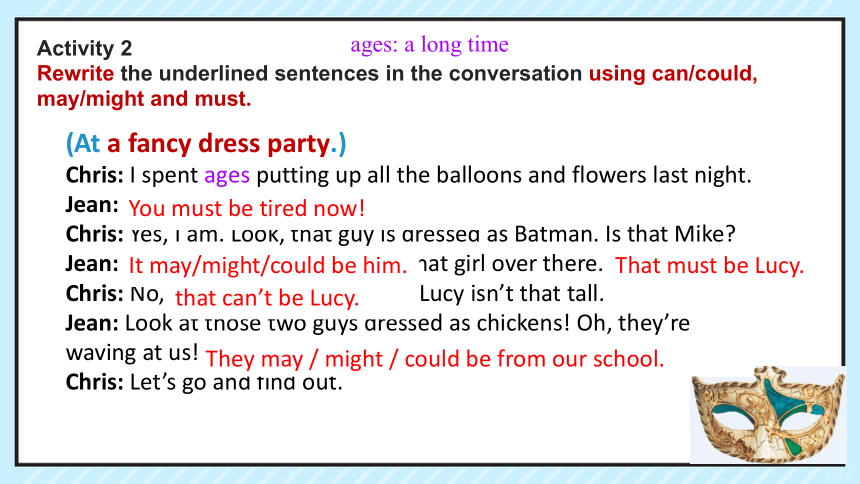
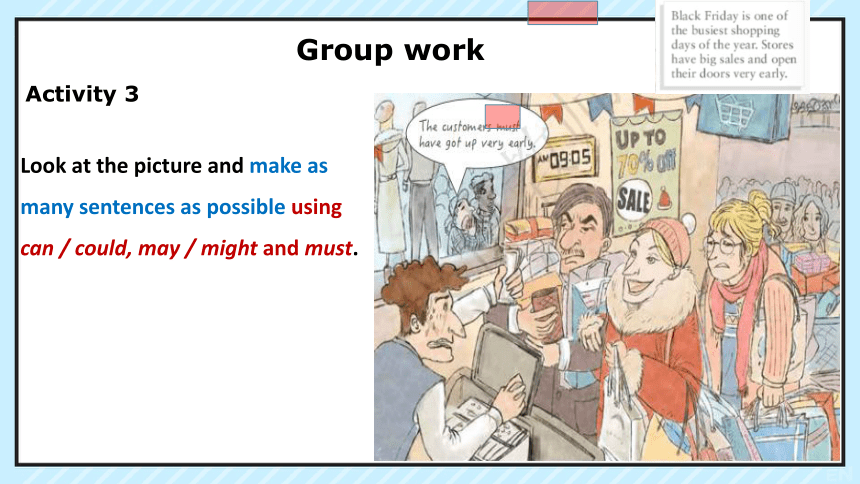
文档简介
(共44张PPT)
Unit2 Let's celebrate!
Using language
Warm up
1 What do the words in bold indicate: an order a request, ability or possibility
2 Will the meaning of sentence (a) change if we replace"could"with"must"or"might"
3 What happens if we change"must”and
"might"in sentences (b) and (c) into“could"
What is it
Guess
It may be...
It can't be...
It must be...
It could be...
What do the words in blue indicate:
an order, request, ability or possibility
Look at the sentences from the reading passage and answer the questions.
Activity 1
a That is why Letters from Father Christmas could be the perfect book…
b The children must have been very excited as they opened it.
c … they might not receive their presents if they were not good.
命令
要求
能力
可能性
That is why Letters from Father Christmas could be the perfect book…
That is why Letters from Father Christmas must be the perfect book…
That is why Letters from Father Christmas might be the perfect book…
Possibility: must > could > might
2 Will the meaning of sentence (a) change if we replace "could" with "must" or "might"
yes
The children must have been very excited as they opened it.
The children could have been very excited as they opened it.
… they might not receive their presents if they were not good.
… they could not receive their presents if they were not good.
sure
not so sure
Possible to receive their presents
Impossible to receive their presents
3. What happens if we change "must" and "might" in sentences (b )and (c) into"could" Now look for more sentences with modals in the reading passage.
Possibility: ______> _________ > ____________
must
can/could
may/might not
> _____________ > _____________
can’t/couldn’t
may/might
Translation
That is why Letters from Father Christmas could be the perfect book...
The children must have been very excited as they opened it.
这就是为什么《圣诞老人的来信》可能是一本完美的书。
孩子们打开它的时候一定很兴奋。
情态动词 + do,表示对现在的推测
情态动词 + have done,表示对已发生情况的推测
情态动词
(modals)
没有_____、_____的变化
必须和____________构成谓语
用来表示______、_______、______
人称
数
其他动词
态度
愿望
推测
Activity 2
Rewrite the underlined sentences in the conversation using can/could, may/might and must.
(At a fancy dress party.)
Chris: I spent ages putting up all the balloons and flowers last night.
Jean: I expect you are feeling tired now!
Chris: Yes, I am. Look, that guy is dressed as Batman. Is that Mike
Jean: It’s possibly him. Check out that girl over there. I’m sure that’s Lucy.
Chris: No, I don’t think that’s Lucy. Lucy isn’t that tall.
Jean: Look at those two guys dressed as chickens! Oh, they’re
waving at us! Maybe they’re from our school.
Chris: Let’s go and find out.
You must be tired now!
It may/might/could be him.
That must be Lucy.
that can’t be Lucy.
They may / might / could be from our school.
ages: a long time
Activity 3
Look at the picture and make as many sentences as possible using can / could, may / might and must.
Group work
The man with a wallet in his hand might be a bit unwilling to pay.
The woman in red must be very excited to buy so many things.
The woman with glasses may be very tired to get up so early and carry so many bags.
The cashier might be feeling uncomfortable as he is sweating a lot.
1. — Excuse me. Is this the right way to the Summer Palace
— Sorry, I am not sure. It _____ be.
A. might B. will
C. must D. can
Choose the correct answer.
Exercises
2. — Isn’t that Ann’s husband over there
— No, it _____ be him — I’m sure he doesn’t wear glasses.
A. can’t B. must not
C. won’t D. may not
3. You ____ be tired — you’ve only been working for an hour.
A. must not B. won’t
C. can’t D. may not
4. — Is John coming by train
— He should, but he _____ not. He likes driving his car.
A. must B. can
C. need D. may
情态动词+动词原形
1)can +动词原形
A.用于肯定句,表示客观可能性,意为“可能”,即从理论上看是可能的,但不一定会发生。
例如
As a human being, anyone can make a mistake.
(作为人类,任何人都有可能犯错。)
B.用于否定句或疑问句,表示对现在的动作或状态进行主观的猜测,意为“可能",或表示惊异、怀疑等态度。
例如:
a. He can't have a lot of money.
(他不可能有很多钱。)
b. Can it be that it was l, not he, who was mistaken
(难道是我弄错了,而不是他弄错了 )
表示主观的推测,意为“或许”用于肯定句和否定句均可。
例如:
a. He may be very busy now.( 他现在可能很忙。)
b. He may not be at home.( 他可能不在家。)
2)may+动词原形
注意:表示可能性时,can't 语气较强,表示“不可能”;may not 语气较弱,表示“可能不,或许不”。
例如:
a.They might have a lot of work to do now but I'm not sure.
( 他们现在可能有很多活儿要干,不过我不确定。)
b.She was afraid they might not like the idea.
(她担心他们可能不喜欢这个想法。)
3)might+动词原形
表示推测,意为“可能”,可以指过去的情况,也可以指现在的情况,但语气比 may更加不肯定。用于肯定句或否定句均可。
例如:
a.He looks young.He couldn't be over 50.
(他看起来很年轻,不可能超过 50 岁。)
b. Could it be true
(那可能是真的吗 )
4)could +动词原形
意为“可能",可以指过去的情况,也可以指现在的情况,语气缓和。多用于否定句或疑问句。
例如:
a. This must be your room.
(这一定是你的房间。)
b.Look at his new car. He must have a lot of money.
(瞧他那辆新车。他肯定很有钱。)
5)must +动词原形
表示猜测,意为“准是,一定”通常用于肯定句。
例如:
She must have gone home.
(她肯定已经回家了。)
1)must +完成式
表示对已发生情况的推测,通常用于肯定句。
情态动词+完成式
例如:
a. You can't have forgotten her.
(你不可能已经忘记她了。) b.Where can she have put it
(她到底把它放在哪儿了呢 )
2)can +完成式
表示对已发生情况的推测,主要用于否定句或疑问句。
例如:
a. He could not have been more than 16 at that time.
(他当时不可能超过 16 岁。)
b. Could she have forgotten my address
(她会忘记我的地址吗 )
3)could +完成式
表示对过去情况的推测,多用于否定句或疑问句。
例如:
He may / might have come by train.
(他可能是坐火车来的。)
4)may/might +完成式
表示对已发生事情的不肯定的推测,might 相比 may 语气更加不肯定。
Rewrite the underlined sentences in the conversation using can/could, may/might and must.
They may/ might/could be from our school.
You must be tired now!
It may /might/ could be him.
That must be Lucy that can't be Lucy.
Look at the picture and make as many sentences as possible using can/could, may/might and must.
Black Friday is one of the busiest shopping days of the year. Stores have big sales and open their doors very early.
The woman in red must be very excited to buy so many things.
The man with a wallet in his hand might be a bit reluctant to pay.
The woman with glasses may be very tired to get up so early and carry so many bags.
The cashier might be feeling uncomfortable as he is sweating a lot.
Underline the words and expressions about celebrations during the Lantern Festival in the speech bubbles and complete the mind map. Add any more you can think of.
a dress
chocolates
dumplings
parade
have a reunion
dinner
flowers
flags
Describe a festival celebration using the words and expressions you have learnt.
To celebrate..., we often drink/eat...,give...as gifts,decorate with...
Traditionally , people send written invitations for formal events such as weddings.Similarly, these invitations are answered in writing. For more informal events,however, spoken invitations are more common.
Remember to arrive on time if you accept the invitation. Depending on regional customs, it may be acceptable to be 15 to 30 minutes late. It is not advisable to be early, as the host may not be ready
Did
you
know
Before-listening
Please read the tasks in activity7 and 8.
Tony:Hi,Hugo.Are you free next Thursday evening Hugo:Yes,Tony.Why
Tony: Would you like to come over to my apartment We're celebrating Thanksgiving Hugo: I'd love to. lt'll be the fourth Thursday in November, right
Tony:That's right. It's the time to give thanks to our family and friends. We'll get together
to celebrate with a traditional dinner
Hugo: Whats a traditional dinner like
Tony: There'll be a big turkey with all the side dishes - potatoes, vegetables, some fruit and homemade apple pie. My dad is known for his special apple pie - he learned how to make it from my grandma.
Hugo:Wow! Sounds great! What else will we do Will we go out and watch the parade Tony: My home is a bit far from the city center, so unfortunately we won't be able to do that. But there's a football game in the evening.We can watch it on TV after dinner
Hugo:American football It sounds great!
Tony: All right! Come to my apartment at half past five. Hugo: OK.Should I bring anything with me
Tony: No, there'll be plenty of food and drink. But if you'd like to bring some flowers or
candies, my mom would be pleased.
Hugo: Do I need to wear a jacket and tie
Tony: No,you don't have to. It is just a gathering for family and friends. You can wear
anything you like. But it might be a bit cold at night when you go home, so remember to bring something warm to wear. Oh, by the way, you can bring a friend with you if you like. The more, the merrier!
Hugo:Awesome! See you then!
Listen to the conversation and complete the sentences with the correct ending.
b
c
f
Post-listening
Listen again and complete the notes.
Thanksgiving
Thursday
November
apartment
big turkey
apple pie
candies
anything you like
Pair work
Work in pairs. Act out the conversation in activity 7.
Tony:Hi,Hugo.Are you free next Thursday evening Hugo:Yes,Tony.Why
Tony: Would you like to come over to my apartment We're celebrating Thanksgiving Hugo: I'd love to. lt'll be the fourth Thursday in November, right
Tony:That's right. It's the time to give thanks to our family and friends. We'll get together
to celebrate with a traditional dinner
Hugo: Whats a traditional dinner like
Tony: There'll be a big turkey with all the side dishes - potatoes, vegetables, some fruit and homemade apple pie. My dad is known for his special apple pie - he learned how to make it from my grandma.
Hugo:Wow! Sounds great! What else will we do Will we go out and watch the parade Tony: My home is a bit far from the city center, so unfortunately we won't be able to do that. But there's a football game in the evening.We can watch it on TV after dinner
Hugo:American football It sounds great!
Tony: All right! Come to my apartment at half past five. Hugo: OK.Should I bring anything with me
Tony: No, there'll be plenty of food and drink. But if you'd like to bring some flowers or
candies, my mom would be pleased.
Hugo: Do I need to wear a jacket and tie
Tony: No,you don't have to. It is just a gathering for family and friends. You can wear
anything you like. But it might be a bit cold at night when you go home, so remember to bring something warm to wear. Oh, by the way, you can bring a friend with you if you like. The more, the merrier!
Hugo:Awesome! See you then!
Sum up
Homework
1, Recite the words.
2, Finish the exercise book
Thank you !
Unit2 Let's celebrate!
Using language
Warm up
1 What do the words in bold indicate: an order a request, ability or possibility
2 Will the meaning of sentence (a) change if we replace"could"with"must"or"might"
3 What happens if we change"must”and
"might"in sentences (b) and (c) into“could"
What is it
Guess
It may be...
It can't be...
It must be...
It could be...
What do the words in blue indicate:
an order, request, ability or possibility
Look at the sentences from the reading passage and answer the questions.
Activity 1
a That is why Letters from Father Christmas could be the perfect book…
b The children must have been very excited as they opened it.
c … they might not receive their presents if they were not good.
命令
要求
能力
可能性
That is why Letters from Father Christmas could be the perfect book…
That is why Letters from Father Christmas must be the perfect book…
That is why Letters from Father Christmas might be the perfect book…
Possibility: must > could > might
2 Will the meaning of sentence (a) change if we replace "could" with "must" or "might"
yes
The children must have been very excited as they opened it.
The children could have been very excited as they opened it.
… they might not receive their presents if they were not good.
… they could not receive their presents if they were not good.
sure
not so sure
Possible to receive their presents
Impossible to receive their presents
3. What happens if we change "must" and "might" in sentences (b )and (c) into"could" Now look for more sentences with modals in the reading passage.
Possibility: ______> _________ > ____________
must
can/could
may/might not
> _____________ > _____________
can’t/couldn’t
may/might
Translation
That is why Letters from Father Christmas could be the perfect book...
The children must have been very excited as they opened it.
这就是为什么《圣诞老人的来信》可能是一本完美的书。
孩子们打开它的时候一定很兴奋。
情态动词 + do,表示对现在的推测
情态动词 + have done,表示对已发生情况的推测
情态动词
(modals)
没有_____、_____的变化
必须和____________构成谓语
用来表示______、_______、______
人称
数
其他动词
态度
愿望
推测
Activity 2
Rewrite the underlined sentences in the conversation using can/could, may/might and must.
(At a fancy dress party.)
Chris: I spent ages putting up all the balloons and flowers last night.
Jean: I expect you are feeling tired now!
Chris: Yes, I am. Look, that guy is dressed as Batman. Is that Mike
Jean: It’s possibly him. Check out that girl over there. I’m sure that’s Lucy.
Chris: No, I don’t think that’s Lucy. Lucy isn’t that tall.
Jean: Look at those two guys dressed as chickens! Oh, they’re
waving at us! Maybe they’re from our school.
Chris: Let’s go and find out.
You must be tired now!
It may/might/could be him.
That must be Lucy.
that can’t be Lucy.
They may / might / could be from our school.
ages: a long time
Activity 3
Look at the picture and make as many sentences as possible using can / could, may / might and must.
Group work
The man with a wallet in his hand might be a bit unwilling to pay.
The woman in red must be very excited to buy so many things.
The woman with glasses may be very tired to get up so early and carry so many bags.
The cashier might be feeling uncomfortable as he is sweating a lot.
1. — Excuse me. Is this the right way to the Summer Palace
— Sorry, I am not sure. It _____ be.
A. might B. will
C. must D. can
Choose the correct answer.
Exercises
2. — Isn’t that Ann’s husband over there
— No, it _____ be him — I’m sure he doesn’t wear glasses.
A. can’t B. must not
C. won’t D. may not
3. You ____ be tired — you’ve only been working for an hour.
A. must not B. won’t
C. can’t D. may not
4. — Is John coming by train
— He should, but he _____ not. He likes driving his car.
A. must B. can
C. need D. may
情态动词+动词原形
1)can +动词原形
A.用于肯定句,表示客观可能性,意为“可能”,即从理论上看是可能的,但不一定会发生。
例如
As a human being, anyone can make a mistake.
(作为人类,任何人都有可能犯错。)
B.用于否定句或疑问句,表示对现在的动作或状态进行主观的猜测,意为“可能",或表示惊异、怀疑等态度。
例如:
a. He can't have a lot of money.
(他不可能有很多钱。)
b. Can it be that it was l, not he, who was mistaken
(难道是我弄错了,而不是他弄错了 )
表示主观的推测,意为“或许”用于肯定句和否定句均可。
例如:
a. He may be very busy now.( 他现在可能很忙。)
b. He may not be at home.( 他可能不在家。)
2)may+动词原形
注意:表示可能性时,can't 语气较强,表示“不可能”;may not 语气较弱,表示“可能不,或许不”。
例如:
a.They might have a lot of work to do now but I'm not sure.
( 他们现在可能有很多活儿要干,不过我不确定。)
b.She was afraid they might not like the idea.
(她担心他们可能不喜欢这个想法。)
3)might+动词原形
表示推测,意为“可能”,可以指过去的情况,也可以指现在的情况,但语气比 may更加不肯定。用于肯定句或否定句均可。
例如:
a.He looks young.He couldn't be over 50.
(他看起来很年轻,不可能超过 50 岁。)
b. Could it be true
(那可能是真的吗 )
4)could +动词原形
意为“可能",可以指过去的情况,也可以指现在的情况,语气缓和。多用于否定句或疑问句。
例如:
a. This must be your room.
(这一定是你的房间。)
b.Look at his new car. He must have a lot of money.
(瞧他那辆新车。他肯定很有钱。)
5)must +动词原形
表示猜测,意为“准是,一定”通常用于肯定句。
例如:
She must have gone home.
(她肯定已经回家了。)
1)must +完成式
表示对已发生情况的推测,通常用于肯定句。
情态动词+完成式
例如:
a. You can't have forgotten her.
(你不可能已经忘记她了。) b.Where can she have put it
(她到底把它放在哪儿了呢 )
2)can +完成式
表示对已发生情况的推测,主要用于否定句或疑问句。
例如:
a. He could not have been more than 16 at that time.
(他当时不可能超过 16 岁。)
b. Could she have forgotten my address
(她会忘记我的地址吗 )
3)could +完成式
表示对过去情况的推测,多用于否定句或疑问句。
例如:
He may / might have come by train.
(他可能是坐火车来的。)
4)may/might +完成式
表示对已发生事情的不肯定的推测,might 相比 may 语气更加不肯定。
Rewrite the underlined sentences in the conversation using can/could, may/might and must.
They may/ might/could be from our school.
You must be tired now!
It may /might/ could be him.
That must be Lucy that can't be Lucy.
Look at the picture and make as many sentences as possible using can/could, may/might and must.
Black Friday is one of the busiest shopping days of the year. Stores have big sales and open their doors very early.
The woman in red must be very excited to buy so many things.
The man with a wallet in his hand might be a bit reluctant to pay.
The woman with glasses may be very tired to get up so early and carry so many bags.
The cashier might be feeling uncomfortable as he is sweating a lot.
Underline the words and expressions about celebrations during the Lantern Festival in the speech bubbles and complete the mind map. Add any more you can think of.
a dress
chocolates
dumplings
parade
have a reunion
dinner
flowers
flags
Describe a festival celebration using the words and expressions you have learnt.
To celebrate..., we often drink/eat...,give...as gifts,decorate with...
Traditionally , people send written invitations for formal events such as weddings.Similarly, these invitations are answered in writing. For more informal events,however, spoken invitations are more common.
Remember to arrive on time if you accept the invitation. Depending on regional customs, it may be acceptable to be 15 to 30 minutes late. It is not advisable to be early, as the host may not be ready
Did
you
know
Before-listening
Please read the tasks in activity7 and 8.
Tony:Hi,Hugo.Are you free next Thursday evening Hugo:Yes,Tony.Why
Tony: Would you like to come over to my apartment We're celebrating Thanksgiving Hugo: I'd love to. lt'll be the fourth Thursday in November, right
Tony:That's right. It's the time to give thanks to our family and friends. We'll get together
to celebrate with a traditional dinner
Hugo: Whats a traditional dinner like
Tony: There'll be a big turkey with all the side dishes - potatoes, vegetables, some fruit and homemade apple pie. My dad is known for his special apple pie - he learned how to make it from my grandma.
Hugo:Wow! Sounds great! What else will we do Will we go out and watch the parade Tony: My home is a bit far from the city center, so unfortunately we won't be able to do that. But there's a football game in the evening.We can watch it on TV after dinner
Hugo:American football It sounds great!
Tony: All right! Come to my apartment at half past five. Hugo: OK.Should I bring anything with me
Tony: No, there'll be plenty of food and drink. But if you'd like to bring some flowers or
candies, my mom would be pleased.
Hugo: Do I need to wear a jacket and tie
Tony: No,you don't have to. It is just a gathering for family and friends. You can wear
anything you like. But it might be a bit cold at night when you go home, so remember to bring something warm to wear. Oh, by the way, you can bring a friend with you if you like. The more, the merrier!
Hugo:Awesome! See you then!
Listen to the conversation and complete the sentences with the correct ending.
b
c
f
Post-listening
Listen again and complete the notes.
Thanksgiving
Thursday
November
apartment
big turkey
apple pie
candies
anything you like
Pair work
Work in pairs. Act out the conversation in activity 7.
Tony:Hi,Hugo.Are you free next Thursday evening Hugo:Yes,Tony.Why
Tony: Would you like to come over to my apartment We're celebrating Thanksgiving Hugo: I'd love to. lt'll be the fourth Thursday in November, right
Tony:That's right. It's the time to give thanks to our family and friends. We'll get together
to celebrate with a traditional dinner
Hugo: Whats a traditional dinner like
Tony: There'll be a big turkey with all the side dishes - potatoes, vegetables, some fruit and homemade apple pie. My dad is known for his special apple pie - he learned how to make it from my grandma.
Hugo:Wow! Sounds great! What else will we do Will we go out and watch the parade Tony: My home is a bit far from the city center, so unfortunately we won't be able to do that. But there's a football game in the evening.We can watch it on TV after dinner
Hugo:American football It sounds great!
Tony: All right! Come to my apartment at half past five. Hugo: OK.Should I bring anything with me
Tony: No, there'll be plenty of food and drink. But if you'd like to bring some flowers or
candies, my mom would be pleased.
Hugo: Do I need to wear a jacket and tie
Tony: No,you don't have to. It is just a gathering for family and friends. You can wear
anything you like. But it might be a bit cold at night when you go home, so remember to bring something warm to wear. Oh, by the way, you can bring a friend with you if you like. The more, the merrier!
Hugo:Awesome! See you then!
Sum up
Homework
1, Recite the words.
2, Finish the exercise book
Thank you !
